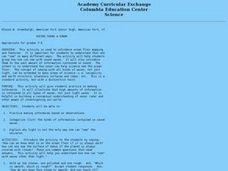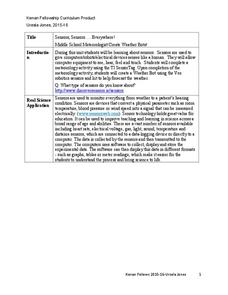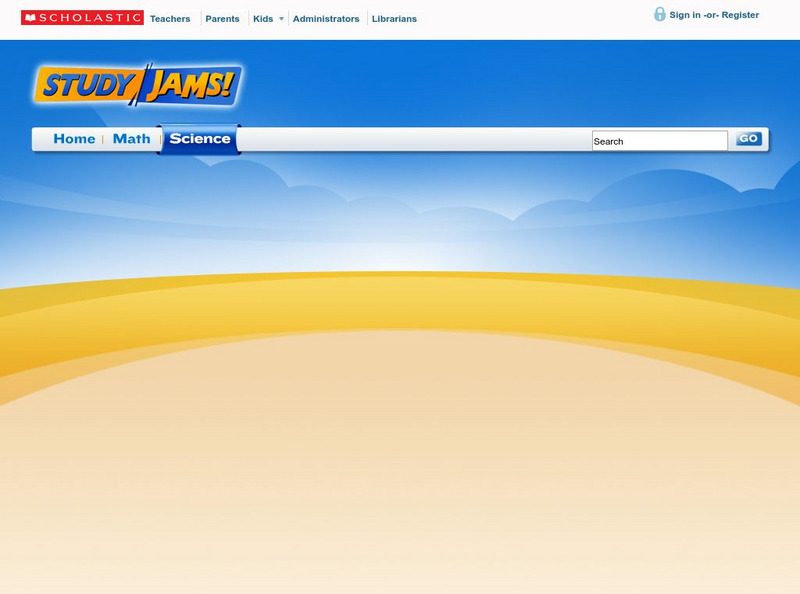Curated OER
Comparing Forecasts To Today's Weather
First graders compare forecasts to today's weather. They gather information about today's weather and record it on a chart. Students record information on the weather and discuss the importance of forecasts.
Curated OER
Wonderful Water
Students identify the various states of water and its natural flow downward. As a class, students take digital pictures of different forms of water and create a multimedia presentation describing their photographs. Groups of students...
Curated OER
Air Pressure
Fourth graders observe a demonstration experiment showing air pressure. They explain air pressure by completing the worksheet.
Curated OER
Seeing Sound and Sonar
Young scholars grasp how underwater animals can "see" using sound waves. They practice making inferences, and build a conceptual understanding of sonar radar.
Curated OER
Planning a Tourist Resort
Students work in teams of 2 to complete the presentation portion of the assignment. They may be required to work alone or may work with their partner to complete the "Board Member's Responses."
Curated OER
Water World Story
Fourth graders write a story about how a drop of water may have traveled to school. They design a presentation on the water cycle.
Curated OER
What Makes a Shadow?
Second graders respond to language, meanings and ideas in different explanatory texts relating them to personal experiences. They listen to and interact with others. Ask questions and talk about personal experiences in a group.
Curated OER
The Bohr-Rutherford Model of the Atom
In this atom model worksheet, students explore how scientists developed the Bohr-Rutherford atom model. Students complete 15 fill in the blank statements.
Curated OER
Forces And Energy
Students investigate the atom and how it is formed. They conduct research using a variety of resources and then construct a model of the atom. Then students have class discussion. The instructional activity includes background...
Curated OER
Exploring the Solar System
Your students can learn more about our solar system with these lesson plan ideas.
Curated OER
Weather Watchers
Students identify basic weather instruments and how they are used to record weather data. Students define several vocabulary terms as stated in lesson. Students use basic instruments to record weather data in their area. Students use the...
Curated OER
Observing Weather
Students investigate the weather by reading children stories. For this weather observation lesson, students read Cloudy With a Chance of Meatballs and several other stories about weather before they create a KWL chart. Students utilize...
Kenan Fellows
Sensors, Sensors…..Everywhere! Middle School Meteorologist Create Weather Bots!
My forecast is that you'll want to use the resource. Pupils design and create a weather bot as part of a project-based unit. These bots should be able to measure temperature, humidity, barometric pressure, wind speed and direction, and...
NASA
Nasa: Introduction to Clouds [Pdf]
NASA is interested in clouds because they are an integral part of the water cycle, and because they are a controlling factor in the energy budget of the Earth. This chart provides a basic introduction to the identification of clouds. The...
Scholastic
Scholastic: Study Jams! Science: Weather & Climate: Clouds and Precipitation
A slideshow and a short multiple-choice quiz on the topic of clouds, how they form, the kinds of precipitation they can create, the main types of clouds, and cloud descriptor terms.
Science Struck
Science Struck: Nimbus Clouds: Facts
Explains how clouds are classified and the characteristics of nimbus clouds.
University Corporation for Atmospheric Research
Ucar: Clouds, a Teaching Box
A collection of educational resources to bring cloud science to elementary students.
CK-12 Foundation
Ck 12: Fifth Grade Science: Earth Science: Weather and Water in the Atmosphere
[Free Registration/Login may be required to access all resource tools.] Discusses what causes weather, what humidity is and its role in the weather, how clouds are classified, and types of precipitation and how they form.
Science Struck
Science Struck: Facts About the Cumulus Clouds
Provides a good description of the characteristics of cumulus clouds.
University Corporation for Atmospheric Research
Ucar: Clouds [Pdf]
Teachers and/or students are given four science experiments related to clouds in our atmosphere. Photos and brief descriptions of the main types of clouds ..Cirrocumulus, Cirrus, Altocumulus, Cumulus, Cumulonimbus, Stratus .. are included.
CK-12 Foundation
Ck 12: Earth Science: Clouds
[Free Registration/Login may be required to access all resource tools.] Describes how clouds form, and describes different types of clouds.
CK-12 Foundation
Ck 12: Earth Science: Clouds
[Free Registration/Login may be required to access all resource tools.] Describes how clouds form, and describes different types of clouds.
CK-12 Foundation
Ck 12: Earth Science: Clouds
[Free Registration/Login may be required to access all resource tools.] Describes how clouds form, and describes different types of clouds.
PBS
Pbs News Hour Extra: Cloud Computing
Wouldn't it be great if all of our documents could be stored on the internet rather than eating up our hard drive space? The concept is 'cloud computing' and this issue provides some concern over this new type of computing.















![Nasa: Introduction to Clouds [Pdf] Graphic Nasa: Introduction to Clouds [Pdf] Graphic](https://d15y2dacu3jp90.cloudfront.net/images/attachment_defaults/resource/large/FPO-knovation.png)



